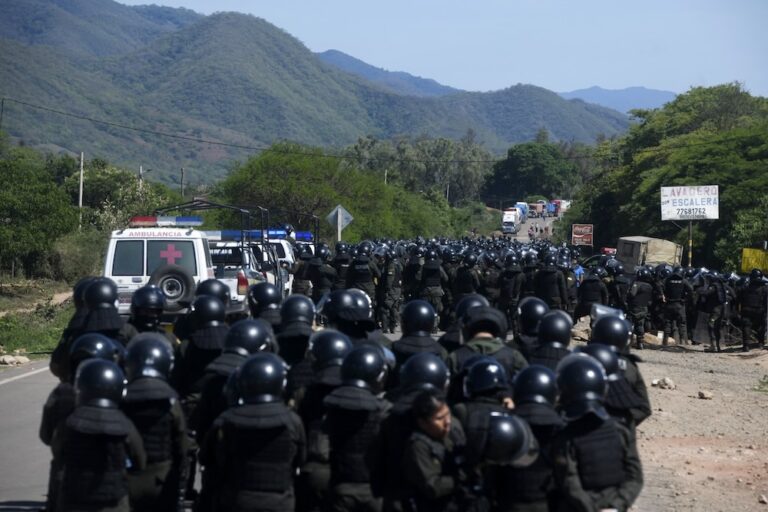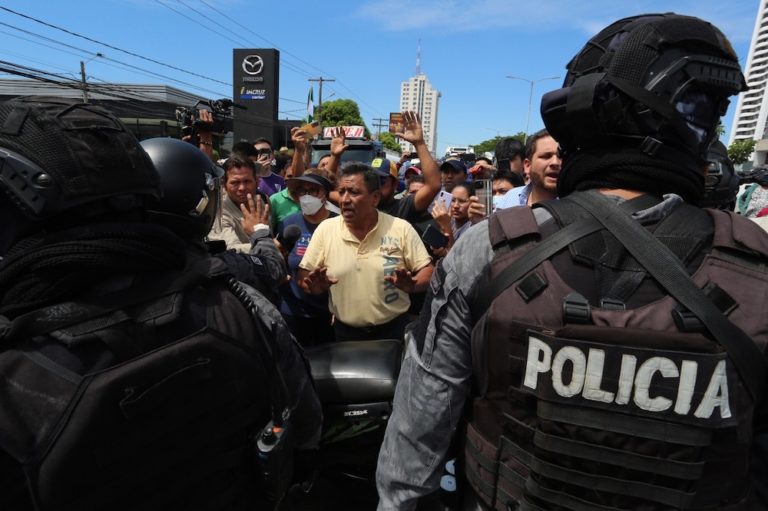The 24 member organisations of the IFEX-ALC network condemn the threats, harassment, attacks and censorship being perpetrated against media outlets and journalists in Bolivia within the context of the country’s current political crisis.
We, the 24 member organisations of the IFEX-ALC network, condemn the threats, harassment, attacks and censorship being perpetrated against media outlets and journalists in Bolivia within the context of the country’s current political crisis. Waves of protests began following the 20 October 2019 presidential election, which was declared to have involved electoral fraud by independent university analysts, a firm contracted by the Electoral Tribunal and an Organisation of American States (OAS) audit that had been requested by the government itself. The unrest eventually triggered President Evo Morales’s resignation.
As of 11 November, the Bolivian Ombuds Office had documented 438 cases of people injured, 227 detentions and 3 deaths associated with the protests. To date, the Bolivian National Press Association (Asociación Nacional de Prensa, ANP) has documented a total of 64 journalists who have come under attack.
The demonstrations against the election results were harshly repressed. Journalists covering the protests were subjected to a range of aggressive actions perpetrated by government agents and demonstrators. On 29 October, police in La Paz used chemical agents against journalists and demonstrators. Daynor Flores Quispe, a camera operator for the private television network Gigavisión, was struck by shrapnel from an explosive on 31 October, and 13 journalists were attacked during protests on 7 November. On the night of 10 November, demonstrators set fire to the home of Televisión Universitaria journalist Casimira Lema.
Fourteen media outlets have also suffered attacks of various types. On 9 November, the Unitel television station’s broadcast signal was interrupted after its facilities in El Alto were attacked by demonstrators. The Mega radio and television station’s studios in Oruro were ransacked and set on fire. Meanwhile, the Fides news agency reported that its Facebook and Twitter accounts were blocked.
Broadcasts of the Boliviatv and Radio Patria Nueva news programs were suspended on the afternoon of 9 November due to threats and attacks carried out by demonstrators against several of the outlets’ journalists. The Página 7 daily newspaper did not circulate on 11 November as the media outlet was concerned about possible attacks on its journalists. The El Diario, El Alteño, Los Tiempos, Opinión and Gente newspapers also suspended circulation. In addition, José Aramayo, director of the weekly Prensa Rural and the Comunidad radio station, operated by the Bolivian Campesinos’ Union, was tied to a tree and threatened with explosives by residents of La Paz’s Miraflores district.
The Inter-American Commission on Human Rights (IACHR) reiterated its “call to all political and social actors in Bolivia to refrain from using violence as a means of political coercion,” underscoring that “discourses that incite violence are contrary to human rights.”
In crisis situations it is imperative to provide guarantees for the work of the media in order to ensure broad and diverse events coverage.
In addition, commitments to democracy and human rights require open, free and participatory debates, as well as timely information delivery to citizens for security and decision-making purposes.
Restrictions on access to information and freedom of expression are clearly indicative of anti-democratic behaviours, and represent a violation of Bolivian citizens’ human rights.
We, the members of IFEX-ALC, condemn the violent actions taking place in Bolivia and the many attacks on the press, as well as the excessive use of force against demonstrators. We fervently call on the Bolivian authorities to fulfil their obligations to:
- Provide protection and guarantees for the safety of journalists covering the protests.
- Refrain from using the state apparatus and armed forces to attack and censor critical voices.
- Comply with international human rights treaties ratified by Bolivia, which guarantee the freedom to carry out journalism in order to provide reliable information on issues of public interest, and which also protect citizens’ rights to receive information. Access to a free and independent press is a right of all citizens and an obligation for all democratic governments.
- Promptly and thoroughly investigate and punish any state agents, demonstrators or other individuals responsible for attacks on journalists.
- Promptly and thoroughly investigate reports of excessive use of force by state agents against demonstrators, and punish those responsible.
About IFEX-ALC:
IFEX–ALC, which forms part of the broader global IFEX network, is comprised of 24 organisations in 14 Latin American and Caribbean countries dedicated to defending freedom of expression and press freedom.



